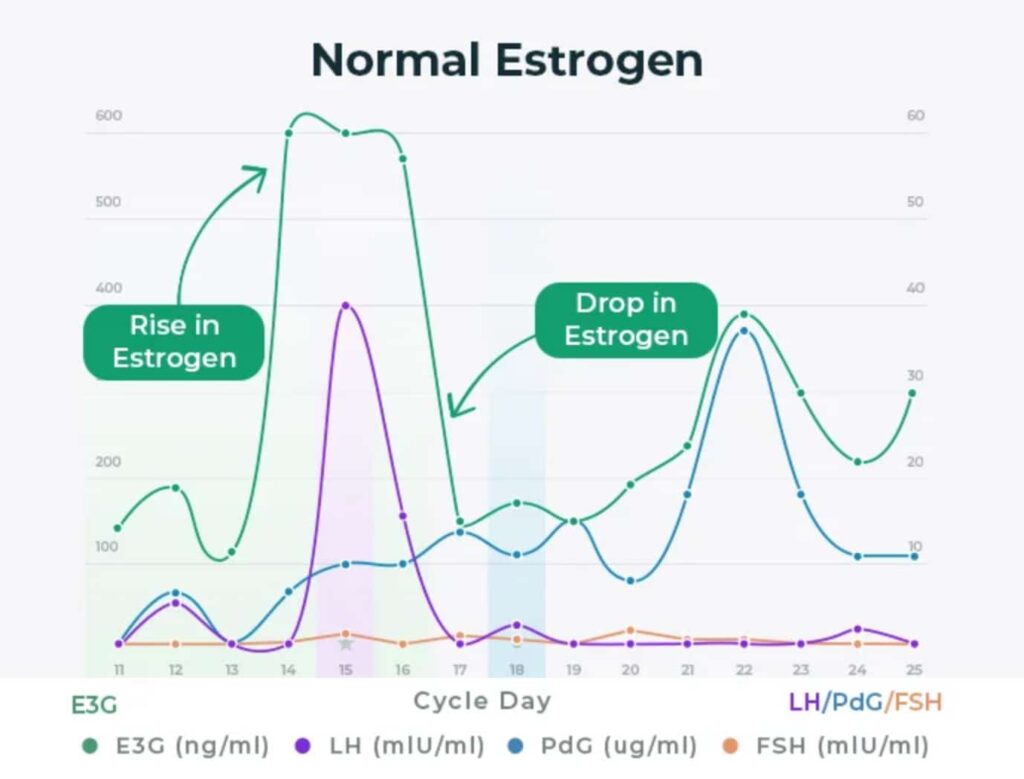It hits out of nowhere:
A spiral of irritability, panic, overstimulation, or total emotional collapse.
You check your period tracker—nope it’s not PMS.
You’re ovulating.
But, instead of feeling strong, or magnetic, or grounded…you’re unraveling.
What gives?
This isn’t about your mindset. It’s about biology.
Estrogen is surging. Progesterone hasn’t kicked in yet. And if your nervous system is already on edge?
That hormone spike hits like a tidal wave.
What’s Supposed to Happen Mid-Cycle
Ovulation is often described as the good part of your cycle.
In a textbook scenario:
- Estrogen rises sharply to trigger ovulation
- Testosterone increases slightly to boost energy and libido
- Progesterone shows up after ovulation to calm and stabilize things
If everything is working smoothly, this can feel like a sweet spot.
But in perimenopause, the system is anything but smooth.

The Estrogen Spike Feels Good—Unless Your System Is Already Strained
Estrogen is a stimulating hormone. It energizes. It sharpens your brain. It revs up your metabolism.
However, it also activates histamine, increases emotional intensity, and—if your body is already dysregulated—can push you over the edge.
Especially when:
- Progesterone is too low to provide a calming counterbalance (common in perimenopause)
- You’re already living with elevated cortisol or poor sleep
- You’re sensitive to histamine, overstimulation, or mood swings
Suddenly, ovulation feels less like a confidence stride and more like a panic spiral.
Take a look at the chart below and see that two times during your cycle, around the 15th and 22nd, you might feel the effects of an estrogen spike and a progesterone fall.
While these ebbs and flows are normal, they’re more pronounced during perimenopause. And with a dysregulated nervous system, the symptoms are amplified.


Science Check
Estrogen increases histamine production and suppresses DAO, the enzyme responsible for breaking histamine down. This can lead to symptoms like anxiety, headaches, skin flare-ups, digestive issues, and irritability, especially mid-cycle when estrogen spikes.
Source Hormonal Effects on Asthma, Rhinitis, and Eczema
Histamine metabolism and female sex hormones in women
It’s Not Just Hormones—It’s a Nervous System Without a Buffer
Think of your emotions like sound coming through an amplifier. Estrogen turns the volume up.
If your nervous system is grounded and calm, that volume boost might feel energizing.
But if your system is already overstimulated, overslept, and underfed? That same estrogen spike pushes the volume to 11. And suddenly, everything feels too loud, too hard, too much.
This is what happens when hormonal shifts interact with nervous system dysregulation.


Science Check
Low progesterone in perimenopause reduces GABA tone and serotonin levels, both of which are critical for calming the nervous system. Without these neurotransmitter supports, the excitatory effects of estrogen are amplified, making women more vulnerable to anxiety, overstimulation, and mood instability.
Source Progesterone and Its Metabolites Play a Beneficial Role in Affect Regulation in the Female Brain
Nervous System Regulation Doesn’t Stop the Spike—It Softens the Impact
You may not be able to control how estrogen behaves during ovulation.
But you can control how prepared your body is to meet it.
When your nervous system is regulated:
- Your baseline cortisol stays lower, so you’re less reactive
- Blood sugar remains more stable, preventing emotional crashes
- Vagal tone improves, helping you recover from stress faster
- Histamine response stays more manageable
- The emotional “volume” gets turned down

Inside Your Daily®, you’ll find tools built for this exact moment—when your hormones spike and your body needs extra support.
Use short somatic resets, breathwork, or even just nervous system-friendly meals to help your body move through ovulation with more steadiness and less chaos.
Join the app and start regulating today →
You’re Not Too Sensitive. You’re Under-Resourced.
This isn’t a weakness.
It’s your body responding to what’s happening inside it.
Ovulation isn’t supposed to feel like a meltdown.
But, when estrogen spikes without progesterone to back it up, and your nervous system is already maxed out, it creates a perfect storm.
The good news: It’s not all in your head. And it’s not forever.
You can’t avoid hormonal changes. But, you can support your nervous system so your body doesn’t have to brace against them.

This looks like:
- Eating regularly to keep blood sugar stable and avoid cortisol spikes
- Doing a few minutes of somatic movement to release tension from your body
- Breath pacing or grounding exercises to signal safety and calm
- Skipping high intensity workouts midcycle and walking instead
- Prioritizing rest light and slower mornings during your most sensitive days
I want to be clear: these aren’t massive life changes. You don’t have to completely upend your life. They’re nervous system cues small, steady actions that tell your body: “You’re safe. We’ve got this.”
And when your body believes that?
Your hormones no longer have to feel like your enemy. You don’t have to hate your body, or shame it into being “better” or “good.”
This is what we mean when we say learn how to work with your body, not against it.
Not sure how to start? That’s where we come in!
Download the Your Daily® app and start feeling better in one check-in.





